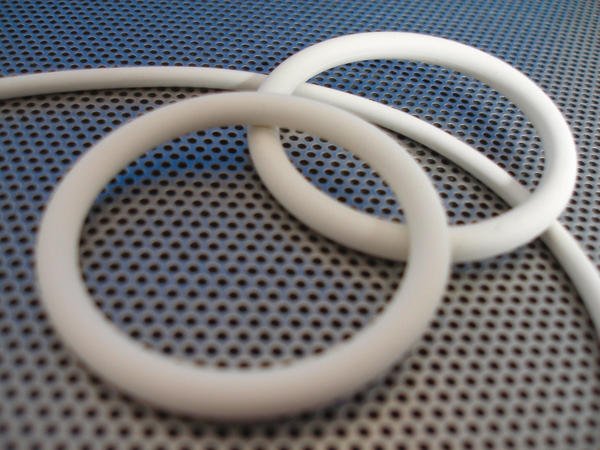Elastomer seals in pharmaceutical equipment need to be resistant to chemicals and solvents used in the manufacture of crudes and pures. Equally important, they also have to withstand repeated high-temperature water and steam cleaning cycles. Achieving this with a single elastomer material has traditionally been very difficult without resorting to often cost-prohibitive perfluoroelastomers.
Pharmaceutical equipment features a variety of FDA and USP Class VI compliant sealing materials. For example, water-resistant EPDM (ethylene propylene diene M-class rubber) is widely used in equipment for processing water-based products. Where chemicals are involved, a hydrogenated nitrile butadiene rubber (HNBR) is typically preferred. However, both materials have their weaknesses. EPDM lacks chemical resistance and HNBR will swell in steam; both lack high-temperature resistance above +150 °C.
Fluoroelastomer (FKM) seals, on the other hand, provide resistance to high temperatures as well as to a broad range of chemicals and solvents. However, this elastomer type tends to show poor resistance to hot water and steam. At present, process engineers have to replace FKM seals more frequently than they would really like, if seal failure during production is to be prevented. Alternatively, they could avoid using FKM seals completely and instead choose perfluoroelastomer (FFKM) seals from the outset to cope with pharmaceutical compounds and steam cleaning operations. Yet in most cases, the productivity benefits of FFKM seals are outweighed by the cost of the elastomer.
Condensation versus peroxide
Development work to improve the water and steam resistance of FKM has focused on changing the way in which the elastomer is manufactured. Within the FKM family of materials, there are different cure systems – in other words, the chemical cross-linking reaction (vulcanisation) that is necessary to join the polymer chains together. Most FKM sealing materials belong to one of two types: co-polymer or terpolymer. The widely used and well established, bisphenol-cured, co-polymer fluoroelastomers are cured by means of a condensation reaction, in which water is also produced. When the fluoroelastomer is exposed to high-temperature water and steam environments, the cure is reversed, breaking down the material’s cross-links and leading to premature failure of the seal.
Peroxide-cured, terpolymer fluoroelastomers do not suffer this reverse condensation reaction. Instead, the peroxide cure system is based on a free-radical reaction, and as such provides superior water and steam resistance. This, in combination with new compounding techniques, now enables FKM elastomers to withstand steam cleaning regimes up to +200 °C.
A peroxide-cured fluoroelastomer recently achieved FDA compliance, allowing it to be employed in pharmaceutical processing equipment. This steam-resistant fluoroelastomer has already been implemented in applications such as sanitary pipe couplings and ball segment valve seals. In both cases, the FKM seals have withstood many more steam cleaning cycles than their conventional counterparts without being exchanged.
More steam cleaning cycles
The development of steam-resistant, peroxide-cured fluoroelastomers means that process engineers are no longer obliged to make a trade-off between the poor performance of traditional FKM seals in water and steam and EPDM materials that exhibit good water and steam resistance but lack FKM’s chemical and high-temperature stability. Moreover, the new fluoroelastomer material offers the prospect of significant productivity benefits, because the same FKM seals can be used for longer and through more steam cleaning cycles before requiring replacement.
Online-Info www.cpp-net.com/2110468
Share:







